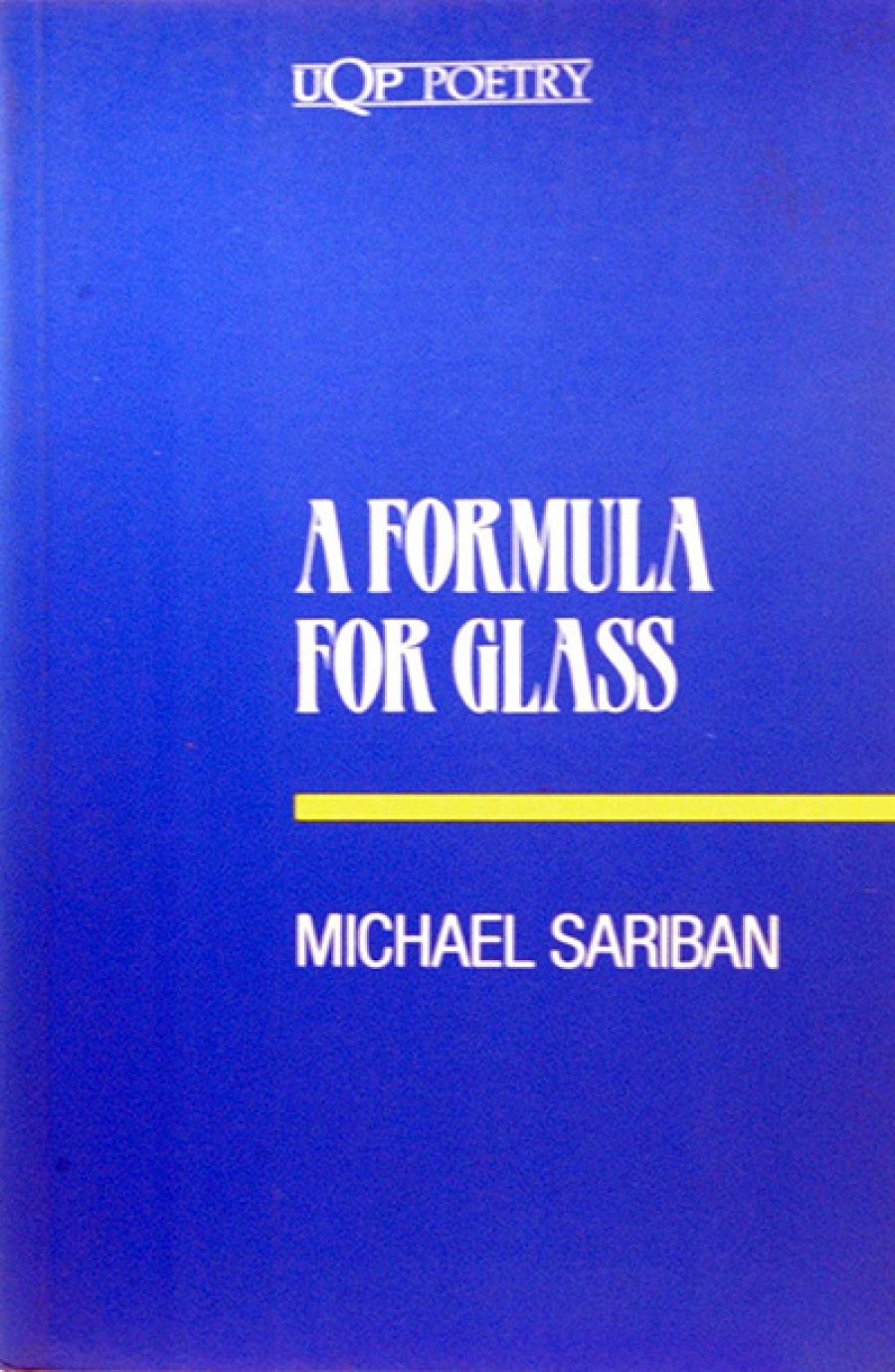
- Free Article: No
- Contents Category: Poetry
- Review Article: Yes
- Online Only: No
- Custom Highlight Text:
Michael Sariban has provided us with a new and memorable collection of poetry. In 1984, the Queensland Community Press produced At the Institute for Total Recall, which met with an enthusiastic response.
- Book 1 Title: A Formula for Glass
- Book 1 Biblio: University of Queensland Press, 116 pp, $7.95 pb
A Formula for Glass is largely comprised of themes of loss, partings, grief and pain. But it never becomes morbid – mainly because of the wistful, philosophical tone it takes. The narrator is often detached and says that he feels he is sometimes ‘watching through glass’.
Images of glass constantly recur and they are larger associated with reflection, or contemplation. This is cerebral poetry; the narrator speaks from an isolated viewpoint. He says, ‘I offer nothing but observation / and universal self’.
The other two main characters – his father and his wife – both die, and he is left alone, trying to get in touch with his feelings about them, and coming to grips with their deaths.
The short poem, ‘The Telling’, sums up the whole poetic process of the first section, Returning. It describes having ‘reached deep’ within oneself to capture the past, feeling it ‘as surely / as mud between the fingers’. But it is a moment of self-reflexive disappointment when ‘we see our dreaming grow fat on the pages / and dwindle to words again’.
Sariban can be a metaphysical poet exploring emotions and intellectualising death. His ‘love that is dead’ – love for his father and wife – remains within him, like a genie in a bottle, easily brought to the surface by what he describes as ‘acknowledged nutrients’. These are usually sharp, and painful reminders of the dead ones. But the reality of the situation is that he is alone, so that when you
Press your nose against the glass
... your own breath
answers back
A Formula for Glass is very delicate poetry – it demands close attention. There’s no formal poetic measure. The melody is produced by the pulses of emotion. The punctuation works in much the same way. Commas and full stops are absent, and stresses and pauses are created by the use of spaces on the page.
This is a largely self-contained world, which can a sometimes tend towards the trait or mundane. Usually, though, are deftly woven together in a terse manner and there are memorable moments of gentle irony and quiet humour.
A Formula for Glass is very personal, mainly about senses of place and relationships of other people. It is also about the narrator sense of continuity – and sometimes the lack of continuity – between his first home country, or German Fatherland, and his new country. Sariban is also concerned with the continuities of father and son relationships; with his own father and his own son.
Sariban, however, avoids the link between the insistence on strong paternal relationships and the establishment of patriarchal structures in society, which is a dominant aspect in the work of poets such as Ezra Pound. He is careful to limit his relationship with his father and son to a personal bond of love and tenderness. The relationships are important, rather, in the creation of self-identity.
When Sariban returns to Berlin, he sentimentally tries to find the place where his father met his mother, and where he sat in the Olympic Stadium. At his father’s funeral, he feels that the life force of the dead man is a part of his own self: ‘I want to break into a run /
to show you you are still alive.’ The physical is very important. He feels both emotional and physical warmth as he lies in bed under the blankets with his baby son. In one poem called ‘snakes’, he lies responding to bodily sensations:
my body is playing the snake
inside me my head
is not spinning I am lying on my
side
quietly thinking about sleep.
Yet of all the physical sensations, the sexual is the most conspicuously absent here. Love relationships are examined, but a distance. One poem concerned this theme – ‘Relativity’ – goes like this:
After an unspecified number
of years a relationship acquires
the status of a lifetime: can be turned between finger & thumb
In retrospective will appear
puzzlingly long
dazzlingly short
whichever way the light catches it
if this book of poetry puts forward ‘a formula for glass’, a theory about
contemplation, it is that it is relative.
Experiences and emotions change according to the angle of reflection of perception.
but there’s some things that remain impossible to get around, whatever way you look at them. the tragic death of his wife is really stinging for the reader, and we see that poet screaming with grief in his car and envying a red carnation full of rude life while his wife slips tragically away. ‘over the years i believe i have learned / no strategy for loss’.
This is the work of a talented poet and deserves to be read. it is graceful, highly refined poetry. words are used sparingly and eloquently. but A formula for glass has an unfortunate tendency to slip so far into the personal that it often refers to events without explaining them. I was left feeling like an intruder, a voyeur – though glad that I’d stumbled across such well-composed pieces of writing.


Comments powered by CComment